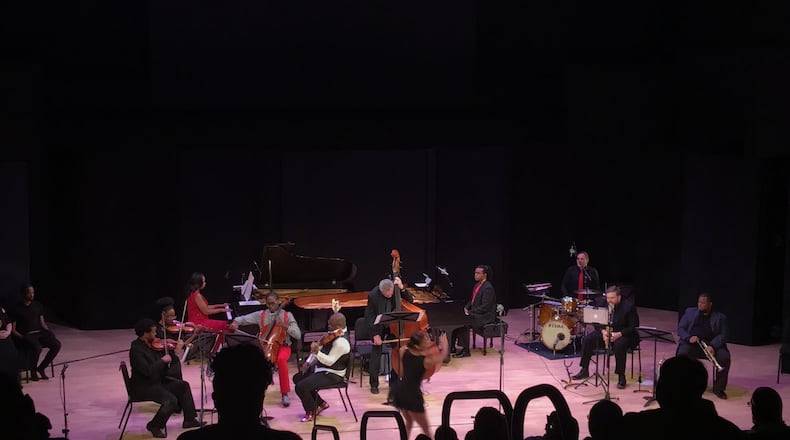Between the ongoing popularity of the Concerts@First series and the regularly packed performances at Emory’s Schwartz Center for Performing Arts, it’s abundantly clear that chamber music has become the go-to format for Atlanta’s classical music scene as it recovers from the ennui of COVID-19 isolation.
Such performances, carried out by a Who’s Who of the Atlanta classical elite, have been consistently excellent — at times even transcendental. But after a point, it can be burdened by a sense of overfamiliarity with the same familiar faces and venues showing up time and again. For that reason alone it was refreshing to discover not only the Fusion Chamber Ensemble, but the newly established Mixdeity performance hall.
Founded in 2016 by musician and educator Karin Banks, Fusion takes its name from its amalgamation of two smaller groups, the Aida Chamber Ensemble and the Gerald Freeman Jazz Ensemble, with the intention of fusing the often disparate worlds of jazz and classical. The result is a joyous and life-affirming celebration that strips both genres of their cultural pretensions and leaves the listener consistently transfixed by music in its most unadulterated form.
Last Sunday’s concert commenced with the third movement of Florence Price’s Quintet in A Minor, a piece which served to set the mood with its classical motifs and swinging feel reminiscent of similar works by Claude Bolling and Dmitri Shostakovich. The invigorating opener was followed by Price’s “Adoration,” a duet for piano and violin carried off with delicate grace by Karin Banks and Christopher Mosley, respectively. Mosley’s performance would be nothing short of sublime, with its arresting tone that seemed to give each successive note its own distinct personality.
The focus shifted fully to jazz with the Gerald Freeman Ensemble performing “Rosetta” by Earl Hines, “Body and Soul” by Johnny Green and “All the Things You Are” by Jerome Kern. Freeman himself imbued each of the pieces with the sort of rollicking, vintage groove popularized by early greats like Scott Joplin and Jellyroll Morton that never fails to invigorate. Aiding Freeman in the uproarious euphoria was Anthony Bailey on trumpet, with his mute solo on “Rosetta” deserving particular commendation. Taken in rapid succession, both soloists revealed an almost telekinetic command of the melody that underlies their phrases, making their contributions feel less like improvisation and more like extensions of the composed melody. It is that very ability that distinguishes jazz masters from the meandering mess that befalls their lesser counterparts.
During this trio of standards there would emerge, however, one singular voice that would dominate throughout the remainder of the night, namely drummer/percussionist Paul Vogler. I was initially captivated by the deft fluidity of his transitions between brushes and mallets during “Body and Soul,” a subtle and understated feat that would reveal the effortless depth of his virtuosity.
That captivating performance would go on to permeate the rest of the evening and prove most effective on a rendition of Astor Piazzolla’s “Primavera Porteña.” Although primarily a dialogue between violin and cello, it was Vogler’s serpentine grooves that tied everything together, the gentle rolls and accentuations giving the two principle instruments a sense of erotic intimacy reminiscent of the mondo exotica stylings of Martin Denny.
The evening, which ultimately clocked in at an impressive two hours, continued in this same vein, showcasing pieces that were purely jazz or classical and then bringing together members of both ensembles to combine the two. This occurred most notably in Karin Banks’ own original pieces, “Elegy” and “Duality,” the latter of which called together the entirety of both bands for a stirring, if unfortunately brief, finale.
It’s easy to gush endlessly about the evening’s ongoing barrage of stellar performances, so I will instead draw attention to the rendition of Arvo Pärt’s “Spiegel Im Spiegel,” a personal favorite since hearing it used as the soundtrack to a dance concert by GloATL over 10 years ago. It is a masterwork of minimalism featuring a careful and measured dialogue between piano and cello, here carried out by Banks and cellist Marla Majett with an almost hypnotic sense of pacing.
The Fusion Chamber Ensemble is nothing short of an injection of fresh blood into the Atlanta music scene, one that ought to be welcomed and celebrated by the chamber music establishment and deserving of a far greater turnout than the modest crowd in attendance. It is unquestionably an ensemble that deserves to be in the forefront of the minds of all Atlanta concert goers.
Jordan Owen began writing about music professionally at the age of 16 in Oxford, Mississippi. A 2006 graduate of the Berklee College of Music, he is a professional guitarist, bandleader and composer. He is currently the lead guitarist for the jazz group Other Strangers, the power metal band Axis of Empires and the melodic death/thrash metal band Century Spawn.
Credit: ArtsATL
Credit: ArtsATL
MEET OUR PARTNER
ArtsATL (www.artsatl.org), is a nonprofit organization that plays a critical role in educating and informing audiences about metro Atlanta’s arts and culture. Founded in 2009, ArtsATL’s goal is to help build a sustainable arts community contributing to the economic and cultural health of the city.
If you have any questions about this partnership or others, please contact Senior Manager of Partnerships Nicole Williams at nicole.williams@ajc.com.
About the Author
Keep Reading
The Latest
Featured



